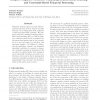34 search results - page 2 / 7 » Using Temporal Neighborhoods to Adapt Function Approximators... |
ICML
2004
IEEE
14 years 5 months ago
2004
IEEE
Reminder systems support people with impaired prospective memory and/or executive function, by providing them with reminders of their functional daily activities. We integrate tem...
AAAI
2006
13 years 5 months ago
2006
Reinforcement learning problems are commonly tackled with temporal difference methods, which attempt to estimate the agent's optimal value function. In most real-world proble...
ATAL
2007
Springer
13 years 10 months ago
2007
Springer
Reinforcement learning promises a generic method for adapting agents to arbitrary tasks in arbitrary stochastic environments, but applying it to new real-world problems remains di...
ICML
2003
IEEE
13 years 9 months ago
2003
IEEE
Reinforcement learning has been used for training game playing agents. The value function for a complex game must be approximated with a continuous function because the number of ...
IJCAI
2007
13 years 5 months ago
2007
We introduce an approach to autonomously creating state space abstractions for an online reinforcement learning agent using a relational representation. Our approach uses a tree-b...

